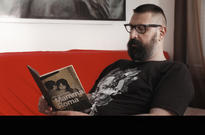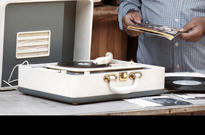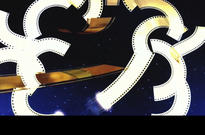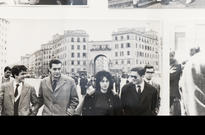TWISTED REALISM
Twisted Realism takes cases in italian cinema in the period of post-war reconstruction and “economic miracle” as starting point to investigate different “aesthetics of reality” and the genealogy of this epoch marked by a re-organisation of capitalism, increasing consumption, new economical and cultural influences, a large national migration, and the emergence of new technologies of vision in the form of television. It proposes a convergence of past and present to question the intertwined histories of architecture, migration and cinema.
The project resulted in a body of interconnected works, which include the film of the same title, a series of photographs and collected documents, as well as vintage objects presented in an architectural display.
Twisted Realism takes Pasolini’s film Mamma Roma (1962) as case study to investigate both the present Italian context and the period of reconstruction and "economic miracle" in italy. Reading fragments of the screenplay, the literary version of Mamma Roma and other documents, a polyphony of voices recounts the scenario of Pasolini’s film as well as different aspects of its production and diffusion, which manifest political moments within the broader cinema agency.
The video revisits some shooting locations of Mamma Roma and embodies a new, singular geography of the contemporary Rome and its historical peripheries. It examines the cinematographic depictions of the urban development of the INA-Casa Tuscolano district, a large-scale social housing project built in 1950-1960 in the framework of a national plan instigated by the Demochristian government, and deconstructs the propagandistic logics of a series of “documentary” films that promoted both the government plans and a new expression of identity and citizenship.
Twisted Realism manifests the institutional and legal frameworks of the current commercial exploitation of Mamma Roma at the very moment of transfer from film to digital (culture). It evokes how the Italian art cinema of the 1960s was commodified in a process of privatisation of culture and monopolisation of the mediascape, as well as how it was appropriated for writing an unifying version of the national history. Bringing together personal and institutional archive material as well as individual memories, it uncovers, behind the mercantile discourses on the “glorious italian cinema of the 1960s”, the power relations and state violence that gave a decisive impulsion to Pasolini’s project.




- Format DIGITAL FILE(DIGITAL FILE)
- Color system PAL
- Color col.
- Year 2010-2012
- Duration 01:15:40
- Languageinfo
Subtitles: English UK
Running text/titles: English UK
Spoken: Italian, French
-
Artists
-
EVENTS